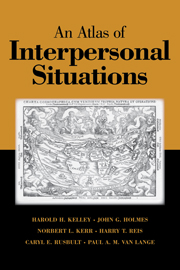Book contents
- Frontmatter
- Contents
- Preface
- PART ONE INTRODUCTION AND THEORY
- PART TWO THE SITUATIONS
- Single-Component Patterns
- Two- and Three-Component Patterns
- Time-Extended Patterns
- Incomplete Information Situations
- N-Person Situations
- Entry #19 Third Parties: Effects of an Outsider
- Entry #20 N-Person Prisoner's Dilemma: Tragedy of the Commons
- Movement from One Situation to Another
- PART THREE EPILOGUE
- References
- Author Index
- Subject Index
Entry #19 - Third Parties: Effects of an Outsider
Published online by Cambridge University Press: 21 October 2009
- Frontmatter
- Contents
- Preface
- PART ONE INTRODUCTION AND THEORY
- PART TWO THE SITUATIONS
- Single-Component Patterns
- Two- and Three-Component Patterns
- Time-Extended Patterns
- Incomplete Information Situations
- N-Person Situations
- Entry #19 Third Parties: Effects of an Outsider
- Entry #20 N-Person Prisoner's Dilemma: Tragedy of the Commons
- Movement from One Situation to Another
- PART THREE EPILOGUE
- References
- Author Index
- Subject Index
Summary
Examples
There are many situations in which a third person is involved in a problem with a dyad. For example, when the dyad lacks information necessary for an important decision, a third person may appear who is able to provide it. As an instance of Entry #17 (Joint Decisions under Uncertainty), a couple in a strange city is not sure whether to enter the restaurant immediately before them or to try to find a better one among possibilities further down the street – along which they cannot see very far. A local resident passes by and they ask his opinion.
A family therapist helps a feuding couple find mutually satisfying coordination solutions to the problems of meshing their conflicting schedules and increasing their periods of relaxation together for romantic interludes. Two drivers arrive simultaneously at an intersection with four-way stop signs and are uncertain as to who should proceed first. They are aided in this coordination problem by a policeman, who signals for one to wait and the other to go ahead.
Two sisters are in strong disagreement about what they should wear to school on the first day. They turn to their older sister and each tries to get her to support their particular preference. Or, they may be quarreling about the use of the bathroom they share. Their mother intervenes, clearly states the value the family places on harmony and fairness, and suggests that they take turns.
- Type
- Chapter
- Information
- An Atlas of Interpersonal Situations , pp. 393 - 414Publisher: Cambridge University PressPrint publication year: 2003



